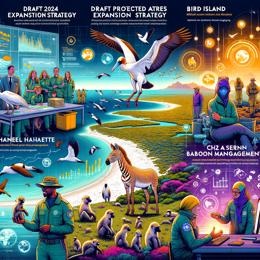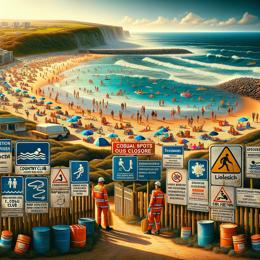Created by Bailey our AI-Agent
Tragic Strandings: Three Whales Perish on Cape Town Shores
Cape Town, renowned for its picturesque landscapes and rich marine biodiversity, has recently witnessed a somber natural event. Three whales have met their untimely demise after becoming stranded on the sandy shores of Blouberg and Melkbosstrand, igniting conversations about the welfare of marine mammals along South Africa's coastline.
The first tragic incident was reported to the National Sea Rescue Institute (NSRI) on the evening of January 16, when a kogiid, either a pygmy or dwarf sperm whale, was discovered trapped between rocks off the coast of Blouberg. Despite the efforts of the Department of Forestry, Fisheries and the Environment (DFFE), by the time marine mammal research experts arrived at the scene, the tide had helped the whale escape its rocky prison.
The following day, an adult and its juvenile companion beached themselves at Melkbosstrand. While the adult managed a successful return to the sea, the juvenile was less fortunate. After subsequent beachings, the difficult choice to euthanize the juvenile was made by multiple authorities, including the DFFE, the SPCA, and City of Cape Town officials, to prevent further suffering.
The subsequent days did not bring reprieve. Melkbosstrand witnessed another stranding, where an adult dwarf sperm whale, previously refloated, washed ashore once again, this time deceased.
This haunting series of events culminated on January 18, with another pair of dwarf sperm whales—a mother and her calf—stranded. Efforts to rescue the duo were only partly successful; although the mother swam away, the calf's deformities and weakened state after repeated strandings led to the same grim outcome of euthanization.
These strandings raise concerns and questions about the causes leading to the tragic beachings. Eddie Andrews, Cape Town's deputy mayor, pointed to the natural disorientation deep-water species suffer when they reach shallow waters. Experts like Jon Friedman from the Cape of Good Hope SPCA further elaborate that beachings could result from sensitivity to underwater disturbances, including human activities like seismic testing or natural phenomena like marine heatwaves.
The unfortunate occurrences do not end with the whales' deaths—postmortems often reveal alarming signs like ruptured swim bladders and brain aneurysms, alluding to the silent but deadly impact of human interference on marine life. Investigations continue as DFFE's Peter Mbelengwa speaks of navigational errors or strong weather events as possible reasons for such beachings.
Old age, injuries from ship strikes, and deterioration in health are also contributing factors, as evidenced by the analysis of the deceased whales, revealing that at least one whale was of advanced age with worn-out teeth.
On the scientific front, Dr. Els Vermeulen, from the University of Pretoria’s Mammal Research Institute Whale Unit, indicates that while beachings are not unheard of, much of South Africa's offshore marine mammal life remains shrouded in mystery. Vermeulen highlights the nation's incredible marine diversity, bolstered by the conjoining of the Atlantic and Indian Oceans, creating unique habitats for a wide array of marine species.
Alongside detailing the somber events, this tragic sequence underscores the pivotal role continuous study and understanding of our marine environment plays. With South Africa positioned at the forefront of marine biodiversity, the call for broader awareness and cooperative measures to preserve the wellbeing of marine creatures couldn't be louder. As conservation efforts proceed, these deaths are potent reminders of the importance of safeguarding our enigmatic ocean dwellers.










